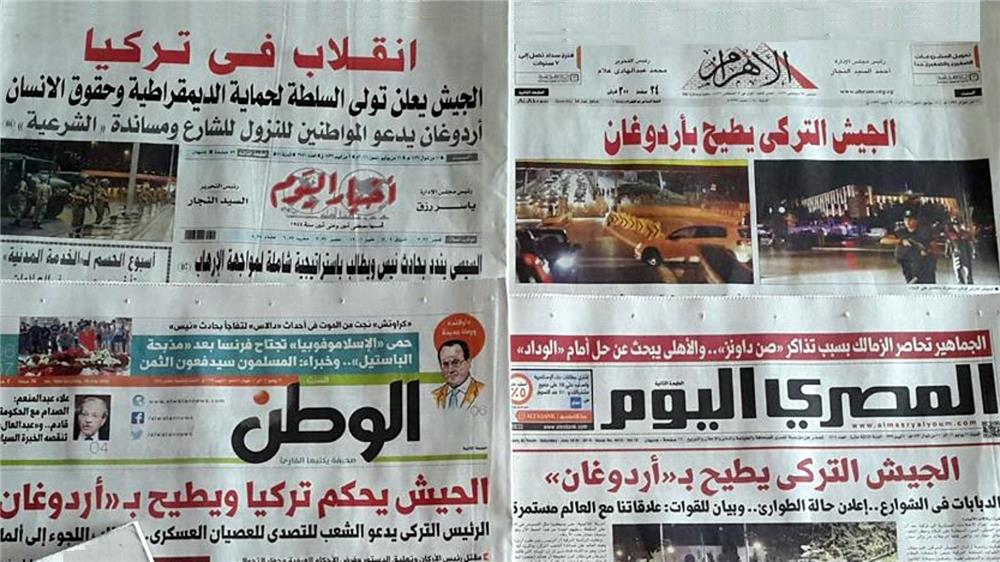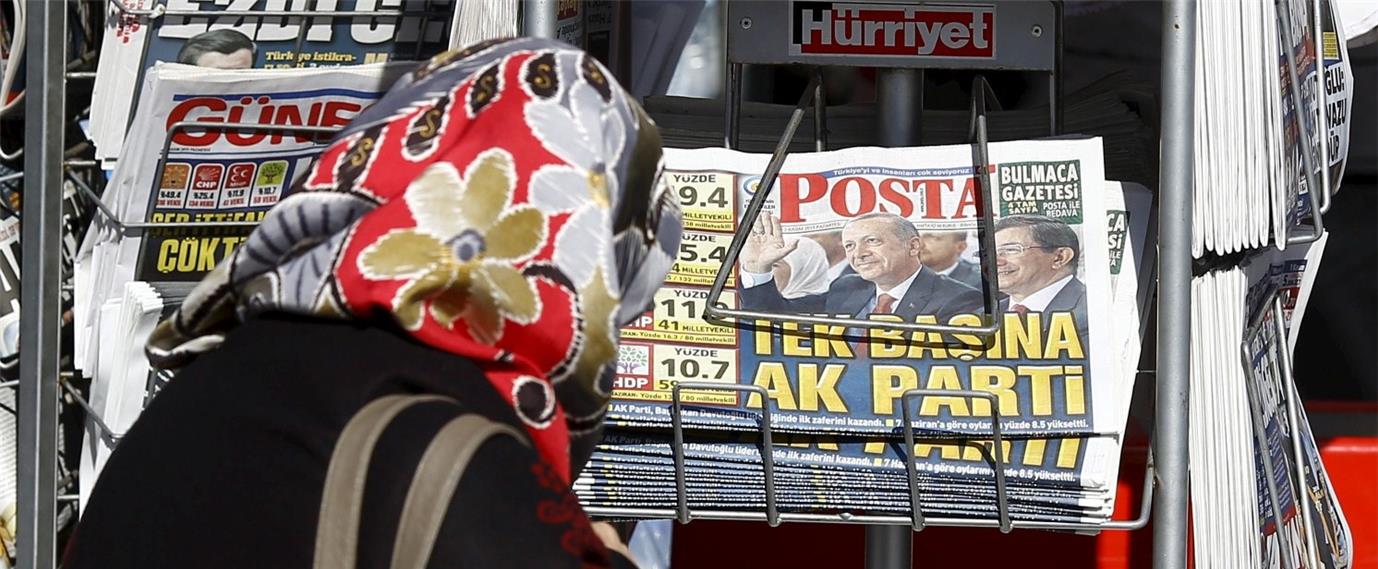في ظل الاهتمام والاندفاع غير المسبوق من قبل الجمهور العربي نحو متابعة أخبار تركيا السياسية والاجتماعية والثقافية، تتزايد الحاجة لإعلام مهني صادق يتحرى الدقة ويمتلك من المقومات ما يسمح له بتحقيق هذه الشروط، خاصة مع اتساع رقعة الأخبار الكاذبة "الموجهة" والمعلومات غير الدقيقة، كل ذلك في وقت يصعُب فيه على الجمهور التأكد من دقة هذه المعلومات بسبب حواجز اللغة.
هذه الحواجز المتعلقة باللغة والتي وَلَّدت كماً كبيراً من الأخبار اليومية غير الدقيقة عن تركيا، لا تقتصر على المغردين والنشطاء في مواقع التواصل الاجتماعي، إنما تتسع لتشمل كماً كبيراً من المواقع الإلكترونية ووسائل الإعلام المكتوبة والمرئية، حيث يلعب التوجه السياسي للوسيلة دوراً حاسماً في تصديق ونشر أي أخبار تخدم التوجه والسياسة التحريرية لهذه الوسيلة.
الإعلام التركي.. خريطة مُصغرة
بين مؤيدة للحكومة وحزب العدالة والتنمية الحاكم ومعارضة بشدة لهما، تبرز مجموعة من وسائل الإعلام التركية التي تحاول الوقوف على خط الوسط بينهما؛ لكن وبغض النظر عن توجهات هذه الوسائل، يتميز الإعلام التركي الناطق بالتركية بالتنوع والضخامة وسرعة التغطية والاهتمام بكل تفاصيل الشأن التركي عبر منظومات إعلامية عريقة يصل عدد صحفيي بعضها إلى عدة آلاف.
مرئياً، توجد مئات الفضائيات الناطقة بالتركية، منها عشرات متخصصة في نقل الأخبار السياسية على مدار الساعة عبر شبكات ضخمة من المراسلين؛ ووصل الأمر أن خرجت بعض الفضائيات الإخبارية بتغطية مباشرة لبعض الأحداث الساخنة في البلاد ومنها محاولة الانقلاب الفاشلة الأخيرة، عبر شبكة مراسلين منتشرين في 81 ولاية تركية في آن واحد.
وعلى الرغم من تراجع مكانة الصحافة المطبوعة عالمياً لحساب الإلكترونية، ما زالت عشرات الصحف اليومية التركية تتمتع بمكانة أفضل من الدول الأخرى لاهتمامها بالتفاصيل والتسريبات السياسية الهامة، إلى جانب تركيزها على الأخبار الاجتماعية والفنية والرياضية؛ وتبرز هنا صحيفة صباح (حزب العدالة والتنمية الحاكم) وجمهورييت (حزب الشعب الجمهوري أكبر أحزاب المعارضة) وملييت (حزب الحركة القومية المعارض) كما تعتبر صحيفة حرييت من أهم الصحف اليومية في البلاد.
وتغذي هذه الوسائل إلى جانب طواقمها الخاصة، وكالات أنباء كبرى كـ"الأناضول" و"إخلاص" و"جيهان" و"دوان"؛ وتتمتع بانتشار هائل في كافة أحياء المحافظات التركية الـ81، وتقول بعضها إنها تمتلك كاميرا في كل زقاق "شارع صغير" في تركيا، للدلالة على قوة تغطيتها.
لكن.. ماذا عن الإعلام التركي الناطق بالعربية؟
على النقيض تماماً مما ذكرناه سابقاً، يعاني الإعلام التركي الناطق بالعربية من حالة كبيرة من المحدودية والضعف والتشتت، الأمر الذي ساهم بشكل كبير في ضعف مصادر الأخبار عن الأحداث في تركيا، وتحولها لمعلومات غير دقيقة وموجهة بشكل كبير في معظم الأحيان.
فعدا عن القناة الفضائية الرسمية الوحيدة الناطقة بالعربية التي تعاني من حالة ضعف ومشاكل إدارية ومهنية كبيرة منذ سنوات طويلة، هناك عدد محدود من المواقع الإلكترونية إما تابعة لبعض الصحف التركية أو لعرب يحملون الجنسية التركية، ومعظمها يعاني من مشاكل في المهنية والدقة ولا يمكن الاعتماد عليها كمصدر موثوق ودقيق للأخبار التركية. كما تعتبر جميعها مؤيدة للحكومة ما عدا موقع صحيفة "زمان" المعارضة والتابعة لـ"فتح الله غولن" المتهم بتدبير محاولة الانقلاب الأخيرة، ويبث موقعها العربي حالياً من مصر بعد إغلاق مقرها في تركيا.
ويبرز في هذا الإطار القسم العربي في وكالة الأناضول الذي تطور كثيراً خلال السنوات الأخيرة وبات يعتبر المصدر الأول لأخبار تركيا بالعربي؛ لكن الوكالة التي يمكن اعتبارها الآن "أفضل الموجود" تعاني من بعض المشاكل في السرعة والدقة بالترجمات كون الطواقم التي تعمل فيها هم من الصحفيين العرب ولا يجيد قسم منهم اللغة التركية بشكل احترافي، كما أن الوكالة تبقى صوت الحكومة وتبث ما تريد له الحكومة أن يصل إلى العالم العربي.
وعلى الرغم من أن حزب العدالة والتنمية عمد إلى تعزيز وسائل مخاطبة العالم العربي ضمن سياسة التقارب الذي اتبعها منذ وصوله إلى الحكم عام 2003، إلا أن هذه الجهود لم تنجح حتى الآن في بناء أي منظومة إعلامية قوية تُمكن المهتمين العرب أو حتى وسائل الإعلام العربية من الاعتماد عليها كمصدر موثوق للأخبار.
وفي ظل هذه التعقيدات، لجأت بعض وسائل الإعلام العربية الكبيرة -وعددها قليل جداً- إلى تأسيس مكاتب لها في تركيا يعمل بها نخبة من الصحفيين العرب الناطقين بالتركية والأتراك الناطقين بالعربية للخروج بأفضل تغطية ممكنة، كما هو الحال في تجربة قناة الجزيرة.
هل يمكن الحصول على "مصادر خاصة" من تركيا؟
في ظل دائرة الاهتمام الكبيرة التي تبديها وسائل الإعلام العربية لأخبار تركيا وفي إطار التنافس يتم بث أخبار تحت عنوان "مصدر تركي خاص" و"مسؤول تركي رفض الكشف عن اسمه" دون ذكر أسماء أو مناصب، لكن حقاً: هل هناك مصادر تركية خاصة تستطيع وسائل الإعلام العربية الوصول إليها؟.
على عكس الدول العربية التي تتمتع بمساحات جغرافية أصغر بالمعظم، وتعج بالناطقين الإعلاميين والقيادات الحزبية الفرعية، تعتبر تركيا دولة مترامية الأطراف وتعاني من مركزية الحكم في الدوائر الضيقة، وتطبق "البيروقراطية" في أعتى صورها، وبالتالي لا تجد سوى الوزراء وكبار المسئولين وناطق إعلامي واحد لكل هيئة فقط مُصرح لهم التحدث إلى وسائل الإعلام، وهي مشكلة تعاني منها أصلاً وسائل الإعلام الناطقة بالتركية.
ولذلك تلجأ بعض وسائل الإعلام العربية ومندوبيها في تركيا إلى نشر بعض الأخبار والمعلومات العادية أو التحليلات التي يطلقها القليل من المحللين السياسيين الأتراك الناطقين بالعربية –الركيكة في معظمها- على أنها مصادر خاصة وحصرية ومهمة، حتى وصل الأمر بمراسل إحدى الصحف العربية إلى أن يكتب ضمن تقريره أن "مصدر تركي خاص أكد لصحيفته أن أسعار اللحوم ارتفعت بسبب اقتراب شهر رمضان".
وفي الوقت الذي لا يجيد فيه أغلب المسئولين الأتراك اللغة الإنجليزية ولا العربية بالطبع، يفتقر كثير من الإعلاميين العرب لـ"لغة تركية متقدمة"، وبالتالي يلجأ الكثير منهم إلى عدد قليل جداً من المسؤولين الأتراك ومنهم السابقين الناطقين بالعربية، للحصول على أخبار خاصة أو حصرية من أشخاص هم أصلاً لم يعودوا في مواقع صنع القرار ويدلون بتحليلات يتم نشرها على أنها معلومات هامة وحصرية.
اللغة.. الحاجز الأكبر
كما هي الحاجة إلى الرجوع لأمهات الكتب في البحث العلمي، تبرُز الحاجة إلى الرجوع إلى المصدر الأساسي في ما يتعلق بأخبار تركيا؛ وهذا الأمر يقود إلى نتيجة هامة ويفترض أنها من "المسلمات" ألا وهي: لا يمكن لصحفي أو محلل سياسي أن يكون مختصاً بالشأن التركي ما لم يكن متقناً بشكل كبير جداً للغة التركية، وعلى الرغم من ذلك نجد "محللين سياسيين" يصفون أنفسهم بـ"المختصين بالشأن التركي" ليس لديهم إلمام باللغة.
فحتى اليوم، ما زالت العديد من وسائل الإعلام ومنها الوازنة تستخدم مصطلحات غير دقيقة عن الحالة السياسية في تركيا من قبيل أن "أردوغان رئيس حزب العدالة والتنمية الحاكم" على الرُغم من أنه لا يحمل هذه الصفة منذ الانتخابات الرئاسة في أغسطس 2014، بل يكتب البعض حتى اليوم عن "العاصمة التركية إسطنبول" على الرغم من أن العاصمة هي أنقرة منذ قرابة 100 عام.
وبات من المعتاد أن ترى مقاطع فيديو لأردوغان يتحدث فيها بالتركية ومترجمة أو مدبلجة بمحتوى لا علاقة له بالسياق لخدمة أهداف معينة، أو وصف لفيديو في غير محله، وأخبار لا أساس لها من قبيل –على سبيل المثال لا الحصر- "دعم أردوغان لمن يتزوج من فتاة تركية"، فكلها أخبار انتشرت بشكل كبير في مواقع التواصل الاجتماعي في فترات مختلفة.
وخلال تغطية أخبار محاولة الانقلاب الأخيرة، انتشرت أخبار عن أن "تركيا تستعد لتوجيه ضربة للإمارات لتدبيرها محاولة الانقلاب"، وأن "الأمن التركي اكتشف غرفة عمليات الانقلاب في قاعدة إنجيرليك التي تستخدمها القوات الأميركية"؛ فهذه أمثلة لأخبار لا أساس لها من الصحة نُسبت لصحف تركية وانتشرت على مواقع التواصل وبعض وسائل الإعلام، ولم يكن بإمكان أي صحفي لا يجيد اللغة التركية التأكد من مدى صحتها.
ولو نظرنا أبعد من ذلك، لوجدنا أن بعض وسائل الإعلام العربية تُرجح توجهاتها السياسية وأمنياتها على "المعلومة" كما حدث قبل أيام خلال محاولة الانقلاب الفاشلة، حيث نشرت مواقع إخبارية وصحف مصرية وعربية مختلفة عناوين نجاح الانقلاب وسقوط أردوغان حتى بعد ساعات طويلة على تأكيد فشل الانقلاب وظهور الرئيس التركي بين أنصاره في شوارع إسطنبول.









































